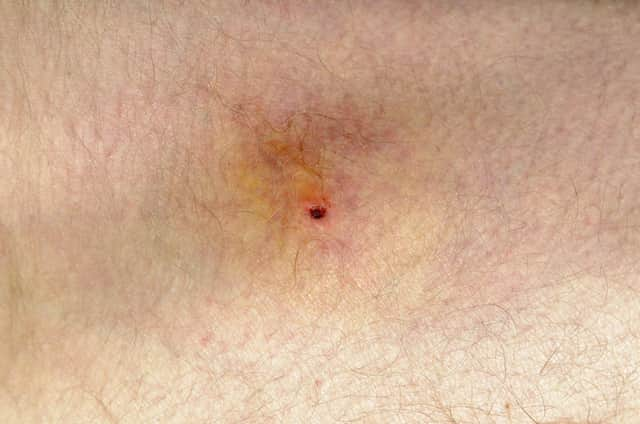People urged to protect themselves against tick bites as lockdown eases


Tick bites can cause Lyme disease, a serious and debilitating illness which can be transmitted to humans through a tick’s bite.
Dr Gerry Waldron, Head of Health Protection at the PHA, explained: “Lyme disease is a bacterial infection which is transmitted by tick bites. The earliest and most common symptom of Lyme disease is a pink or red circular rash that develops around the area of the bite, three to 30 days after someone is bitten. The rash is often described as looking like a bull’s-eye on a dart board.
Advertisement
Hide AdAdvertisement
Hide Ad“You may also experience flu-like symptoms such as tiredness, headaches and muscle or joint pain. If Lyme disease is left untreated, further symptoms may develop months or even years later.”
Ticks are tiny spider-like creatures, which feed on the blood of animals and sometimes people. If you are involved in outdoor activities which take you into the countryside, parks or gardens with wildlife such as squirrels and hedgehogs, you may be at risk of tick bites.
Cases of Lyme disease are often acquired through recreational activities including dog walking, camping, hiking and mountain-biking, where tick exposure is more likely.
Dr Waldron added: “Late spring, early summer and autumn are peak times for tick bites, which coincide with people venturing outdoors in the warmer weather. It’s important that people take preventative measures against tick bites and also look out for ticks after visiting affected areas.”
Advertisement
Hide AdAdvertisement
Hide Ad“Lyme disease can be difficult to diagnose so it is important to get medical advice if a rash or other symptoms develop within a few weeks of a tick bite as early treatment can prevent progression to chronic disease.”
Currently there are no vaccines to defend against tick-borne disease. Therefore, the best defence is to avoid being bitten.
If you find a tick on your or your child’s skin:
* remove it by gently gripping it as close to the skin as possible;
* use a pair of tweezers that won’t squash the tick (such as fine-tipped tweezers), or use a tick removal tool (available from pet shops or vets);
Advertisement
Hide AdAdvertisement
Hide Ad* pull steadily away from the skin without twisting or crushing the tick;
* wash your skin with water and soap afterwards, and apply an antiseptic cream to the skin around the bite;
* don’t use a lit cigarette end, a match head or substances such as alcohol or petroleum jelly to force the tick out (as this may cause the tick to regurgitate potentially infected material into the skin, which may increase the risk of infection).
* Some veterinary surgeries and pet shops sell inexpensive tick removal devices. These may be useful if you often spend time in areas where there are ticks.